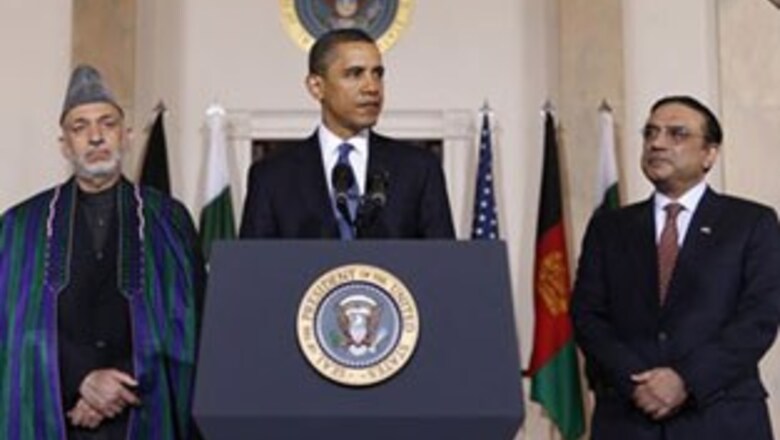
views
Washington: US President Barack Obama has won a promise from Pakistan and Afghanistan to forge a new front in the fight against extremists, saying the security of both countries and the US is linked.
Pakistani Presidents Asif Ali Zardari and Afghanistan President Hamid Karzai understand the seriousness of the threat from Al Qaeda and the Taliban in the border region between the two nations, Obama said on Wednesday after a trilateral summit at the White House.
"Our strategy reflects a fundamental truth. The security of Pakistan, Afghanistan, and the United States are linked," Obama said with Karzai and Zardari at his side.
He had invited the two leaders to the White House in the hope of easing ease years of mistrust between the neighbours and push for a combined drive to crush the Taliban and al Qaeda.
For his part Zardari is seeking US military aid and political support, while Karzai hopes to purge Taliban havens in Pakistan which are destabilising his country.
"I'm pleased that these two men, elected leaders of Afghanistan and Pakistan, fully appreciate the seriousness of the threat that we face, and have reaffirmed their commitment to confronting it," Obama said.
Secretary of State Hillary Clinton meanwhile said the talks, which will continue at cabinet level Thursday, were showing "very promising early signs."
Obama said the leaders of the three nations are meeting "as three sovereign nations joined by a common goal: to disrupt, dismantle and defeat" Al Qaeda and the Taliban.
To do so, Obama said, the three nations have to deny extremists space to operate and bring a better life to the people of Afghanistan and Pakistan.
Al Qaeda and its allies are responsible for killing innocent civilians and challenging the democratically elected governments in the nations, Obama said.
The United States has made a "lasting commitment [that it] will not waver" in efforts to defeat extremists and support the Afghan and Pakistani governments, he said.
Hillary Clinton held talks with the Afghan and Pakistani leaders earlier in the day. Foreign, defence, intelligence and agriculture ministers from both countries and a number of key officials in the Obama administration including US special envoy Richard Holbrooke, General David Petraeus, CIA Director Leon Panetta and FBI Director Robert Mueller joined the talks.
The diverse group, Clinton said, reflects the fact that "promoting peace must be an all-government effort."
Clinton said the talks will address "concrete initiatives" on improving security, boosting economic development and trade and increasing opportunities for both populations.
Zardari and Karzai pledged to work together with the US to combat extremists and stabilize their two countries.
PAGE_BREAK
The India-Pakistan angle
In a cryptic remark, US Secretary of State Hillary Clinton has said the Obama administration would unfold its plans to improve ties between India and Pakistan in "due time".
"Well, everything in due time," she told reporters on Wednesday when asked what action Washington was taking to help improve relations between the two South Asian neighbours given that it looks at Islamabad's India obsession as a big problem in the fight against Taliban.
Later asked to elaborate Clinton's remark at a White House briefing on her meetings with Presidents Asif Ali Zardari of Pakistan and Hamid Karzai of Afghanistan, President Barack Obama's spokesman pointed out that Obama had "brought this up proactively in the news conference last week."
"Obviously given the security challenges ahead in Pakistan, the president believes and the administration believes focusing on the security challenges within the country that are being posed right now make a lot more sense than stockpiling troops on the border," Robert Gibbs said.
At his 100th day press conference Obama had said that Pakistan's military leadership was beginning to recognise "just in the last few days that the obsession with India as the mortal threat to Pakistan has been misguided, and that their biggest threat right now comes internally."
Asked if after the trilateral summit meetings the administration expected to be any closer to an agreement on the fundamental issue of getting the Pakistani army to move its troops from the Indian border, Gibbs said, "I think that process or that discussion is likely to come up in these meetings."
Obama had made clear "his feeling on the priority that currently exists in Pakistan," Gibbs said. "...But I don't want to minimise that this is a complex, multi-layered problem.
"This is not a - there's not a one-step solution to dealing with the challenges in this region or in either of these countries," he added.
At the State Department too spokesman Robert Wood repeated the formulation that the US had "made very clear to them that the existential threat to Pakistan comes from the Taliban, not India."
"The existential threat is coming from within and across the border - on the border area between Afghanistan and Pakistan, and that's where Pakistan needs to focus its efforts."
Asked if the US would take into account India's concerns that proposed billions of dollars in aid to Pakistan may be used to help terrorist groups conduct activities in India, Wood said: "We're going to make sure, to the best of our ability, that this money does not go in the aid of terrorist groups."
In response to another question whether the US would ask India to pull back troops from its border with Pakistan as suggested by the Pakistani ambassador, Wood said: "I am, of course, not going to talk about discussions we may - or the substance of any discussions we have had or will have."
"But it's very clear. And, I think the Pakistani government understands what it needs to do to deal with the real threat that it faces, and that real threat is not coming from India."

















Comments
0 comment